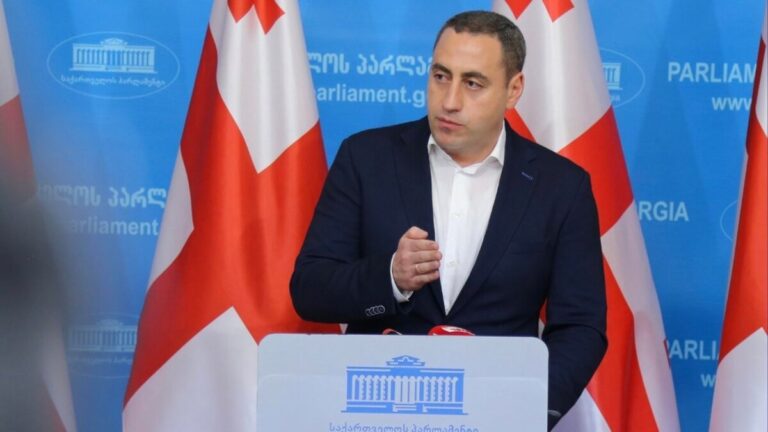The app aims to increase voter engagement by introducing a points system to combat low voter turnout and rewarding citizens who participate regardless of political party. If elected, the opposition plans to digitize civil service halls, enable online management of government registers and conduct investigations. Distribution of Universal Basic Income through an app. United Space envisions a liquid democracy that allows citizens to vote on legislation on a continuous basis, transforming the way they interact with national processes and decision-making.
Georgia’s main opposition party, the United National Movement (UNM), has launched United Space, an identity app powered by the ZK social protocol Larimo.
The app aims to bring national identification cards on-chain and promises to revolutionize the way citizens engage in both electoral and governance processes. The launch comes at a critical time, weeks before Georgia’s October 26 parliamentary elections, amid growing concerns about democratic backsliding and foreign interference.
A new era of democratic participation
The United Space app offers unsupervised, tamper-proof voting and represents a significant change from traditional election processes. Citizens will use the app to vote completely anonymously in upcoming elections, avoiding concerns about privacy violations and potential voter manipulation.
UNM’s new system also introduces a voter rewards program designed to combat Georgia’s historically low voter turnout. Citizens are rewarded for their participation, regardless of political affiliation. This is a strategic push to engage voters, providing incentives for citizen participation as a whole, not just casting a ballot.
Beyond elections: A vision for digital governance
UNM has promised to expand United Space’s functions beyond voting if elected president. The app has the potential to digitize the Georgia Public Service Hall (PSH), a government agency that currently handles important registrations of motor vehicles, businesses, and notaries. Currently, these services require in-person bookings, but the app aims to move the system online and make it more accessible to citizens across the country.
Furthermore, the opposition envisions using the digitized PSH as a platform to experiment with Universal Basic Income (UBI), redistributing the revenues from newly digitized services to the population. There is. This initiative could provide a much-needed financial safety net for many Georgians and be a game-changer for the region.
More ambitiously, UNM plans to implement a liquid democracy model through an app. This would allow citizens to vote not only during elections but also on an ongoing basis, allowing them to have a say in the day-to-day legislative process. This continuous feedback loop between government and citizens has the potential to redefine citizen engagement in Georgia.
Timely solutions to threats to democracy
The launch of United Space could not come at a more pressing time. Georgia is grappling with concerns about democratic backsliding and a growing threat of Russian interference. In this context, United Space positions itself as a tool to strengthen the country’s democratic foundations, providing a safe and transparent means for citizens to participate in governance.
Giorgi Vashadze, a member of parliament and leader of the United National Movement, emphasized the transformative potential of the app. “By providing liquid democracy, increasing citizen participation, and anonymizing polls and voting, United Space will help make Georgia one of Georgia’s strongest democracies.” world. This provides unprecedented privacy, access, and ease of use for citizens as they participate in both the electoral system and day-to-day state services. ”
Rarimo’s breakthrough in privacy technology
At the heart of United Space is a new version of the Freedom Tool, Rarimo’s zero-knowledge citizenship proof solution, which allows citizens to self-issue digital IDs. Unlike other blockchain-based identity systems that rely on third-party issuers, Freedom Tool 2.0 allows users to maintain their own identity by publishing encrypted national identity data to an on-chain registry. You can become a publisher of
Lasha Antadze, co-founder of Rarilabs, emphasized the importance of this technological advancement. “Zero-knowledge technology has now reached a point of maturity that will push blockchain and Web3 into the mainstream and promote privacy and freedom for ordinary people.”
This approach ensures that external third parties, including governments, cannot track or identify the activities of individual users. Even if you have a citizen’s passport key, the only information you can confirm is that the ID is registered on the blockchain. This level of anonymity is especially important given Georgia’s current political climate.
Kitty Horlick, director of RariLab, added: “The benefit of United Space is that citizens become direct stakeholders in national assets, democratic processes, and public services. A national, real-world use case that highlights the potential of zero-knowledge technology.”
What’s next for Georgia’s digital future?
As Georgia heads toward legislative elections, the United Space app has the potential to serve as a model for other countries looking to strengthen democratic participation through blockchain technology. The convergence of decentralized identity, privacy protection, and liquid democracy offers a glimpse into what the future of governance will look like, not just in Georgia but in countries around the world.
Georgia’s blockchain-based democracy experiment could set new standards for transparency and citizen participation in the digital age.
Related article: Voatz implements blockchain voting at Michigan Democratic Convention


